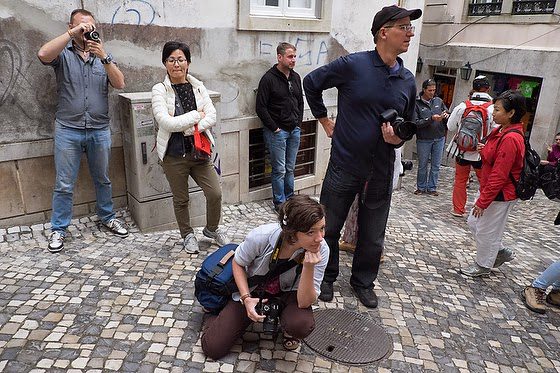| Last year’s storytelling workshop in Lisbon, Portugal [Fuji X-E2, Fuji XF 18-55mm, ISO 6400, ƒ/13, 1/450] |
When teaching workshops on storytelling, we always like to get a feel for what the students want to learn from the experience.
There are some very consistent things people want to learn from a storytelling multimedia workshop. One of the top things listed usually involves software. They want to learn how to use Final Cut Pro X or Adobe Premier Pro, for example.
Now, if we created a workshop based on what people talk about, most would leave the workshop not much better than when they came. Even the things they don’t mention are sometimes at the top of the list.
The workshop location is a HUGE factor in people choosing to attend. They might not sign up if the workshop were somewhere down the street from them versus some exotic place like Cuba, Paris, or Bucharest, Romania.
What students list at the very bottom of their desires to learn is audio.
 |
| Click on the photo to see a larger one. |
Here is the timeline inside Final Cut Pro X on one of my most recent projects. The interview is the foundation for the project, and the sound for this is what is driving the entire project. What the subject is talking about influences what images should accompany the words.
While we teach how to interview and get the sequencing of the interview in an order that helps engage the audience and tell the story. The interview sound must be clear, or all else is a waste.
 |
| Shure FP1 with the WL183 (Omnidirectional) microphone |
Quality Sound
The foundation for every multimedia/video project is the soundtrack. Here are two microphones I use all the time, but regardless of what microphone you choose, you must know how to use it and set the microphone levels to get the sound just right.
 |
| Shotgun Røde Video Pro Microphone |
People will not watch your project if the sound is of poor quality. However, they are more likely to care if they sound high quality and the visuals are mediocre than if they were reversed.
Which Microphone?
My recommendation for anyone going down this storytelling road is to invest in a lavalier microphone. One with a long cord of 20′ will work great for interviews and is reasonably priced. You can get one for about $23 from most stores.
I like this microphone because it picks up sound close to it and drops off pretty quickly, so you can put this on someone’s collar and get their voice, and lavalier will diminish ambient sound around the room.
The shotgun microphone is excellent when you don’t want to see the microphone, and depending on how you place it in relationship to the subject can give you a charming sound. It takes more practice to use this over the lavalier.
NEED to know vs. WANT to know
Now back to the headline. While learning sound is not all that sexy, based on everyone pretty much ranks this at the bottom of what they want to know; it is the foundation of the project. Good sound is equivalent to good exposure with your photography/video, but the difference is that it is more important.
I did a simple package on how I did boxes years ago. It is pretty easy to edit once you have the voice-over recorded. See if you can see how the sound drives the project.
Here you can see the package I produced. The box was in 2008 when I used an audio recorder and photos. But this is the backbone of the video to understand that the soundtrack becomes the timeline for the project.
http://www.stanleylearystoryteller.com/Chick-fil-A/soccer/_files/iframe.html?=550×481
Advice to those wanting to learn multimedia/video
The most important tip I can give you is to be open to the professional teaching you. Try your best to hear what the professional says you NEED to know versus what you WANT to know. Don’t filter out what you think is unnecessary or not that interesting.
Pour yourself into every step of the process of learning a skill. The reason you do this is not that you can pass a test, but instead that you will master the subject.
Do you want a surgeon who passed their tests or knows about your procedure? Just as a surgeon who didn’t pay attention except to the exciting parts of medical school will lose a life, so will the storyteller who only learns what they want to know. They, too, will lose the life of the story.
Here is another example. Listen to the soundtrack and see how it moves the story along.
https://player.vimeo.com/video/68857225

